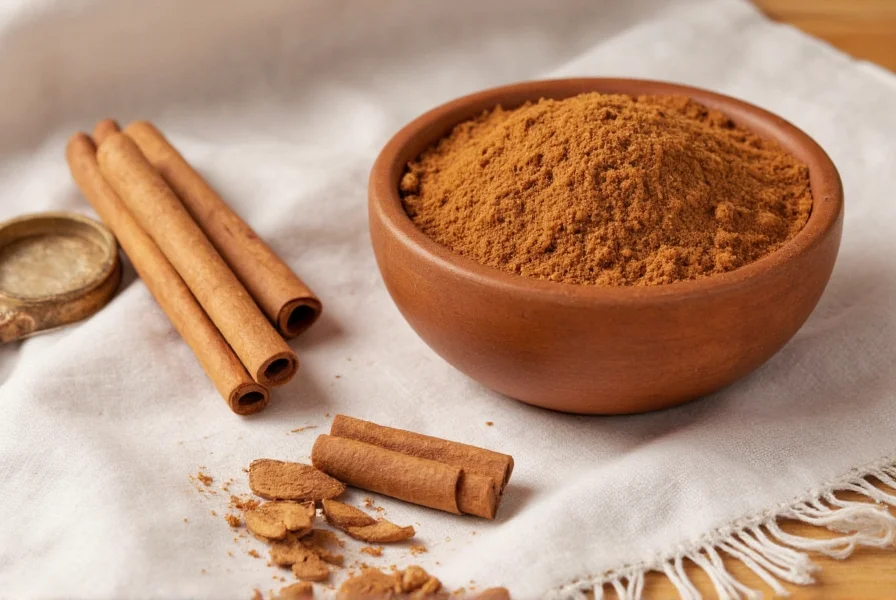When exploring natural remedies and culinary spices, Ceylon cinnamon (Cinnamomum verum) has gained popularity as a safer alternative to the more common Cassia variety. Understanding ceylon cinnamon side effects is crucial for informed consumption, especially for those using it medicinally or in larger quantities.
Understanding Ceylon vs. Cassia Cinnamon
The critical distinction between Ceylon and Cassia cinnamon explains why ceylon cinnamon health effects differ significantly. While both come from the Cinnamomum family, they're botanically distinct species with different chemical compositions.
| Characteristic | Ceylon Cinnamon | Cassia Cinnamon |
|---|---|---|
| Scientific Name | Cinnamomum verum | Cinnamomum cassia |
| Coumarin Content | 0.017g/kg (very low) | 63g/kg (very high) |
| Flavor Profile | Milder, sweeter | Stronger, spicier |
| Physical Appearance | Multiple thin layers, soft texture | Single thick layer, hard texture |
| Primary Growing Regions | Sri Lanka, Madagascar, Seychelles | China, Indonesia, Vietnam |
This fundamental difference in coumarin content explains why ceylon cinnamon safety profile is significantly better than Cassia. Coumarin, while offering some potential health benefits, can cause liver damage in sensitive individuals when consumed in large amounts over time.

Documented Ceylon Cinnamon Side Effects
When examining ceylon cinnamon potential adverse effects, research indicates minimal risks at typical consumption levels. However, certain effects warrant attention:
Minimal Coumarin-Related Concerns
Unlike Cassia cinnamon, Ceylon's extremely low coumarin content (ceylon cinnamon coumarin levels) means liver toxicity concerns are virtually nonexistent at normal dietary intakes. The European Food Safety Authority established a tolerable daily intake of 0.1mg coumarin per kg of body weight. With Ceylon containing approximately 0.017g/kg of coumarin, you'd need to consume over 50 grams daily to approach this limit—far beyond typical usage.
Blood Sugar Interactions
For individuals managing diabetes, ceylon cinnamon blood sugar effects require monitoring. While cinnamon may help regulate blood glucose, combining therapeutic doses with diabetes medications could potentially cause hypoglycemia. Research published in the Journal of the Academy of Nutrition and Dietetics suggests cinnamon may enhance insulin sensitivity, making blood sugar monitoring essential for diabetic users.
Allergic Reactions
Though rare, some individuals may experience mild ceylon cinnamon allergic reactions, including:
- Oral irritation or swelling
- Skin rash when handling the spice
- Respiratory symptoms in sensitive individuals
Anticoagulant Effects
At extremely high doses (beyond normal culinary or even supplemental use), Ceylon cinnamon might theoretically enhance blood-thinning effects due to coumarin content, though this is highly unlikely given its low concentration. Those taking anticoagulant medications should discuss ceylon cinnamon medication interactions with their healthcare provider.
Safe Consumption Guidelines
Understanding how much ceylon cinnamon is safe helps prevent potential issues. Based on current evidence:
- Culinary use: 1/2 to 1 teaspoon (1-3 grams) daily is considered safe for most adults
- Supplemental use: Up to 1-3 grams daily for limited periods (4-8 weeks), though consulting a healthcare provider is recommended
- Long-term use: No established safety data for continuous use beyond 6 months at supplemental doses
When considering ceylon cinnamon dosage recommendations, remember that individual tolerance varies. Start with smaller amounts to assess your body's response before increasing consumption.
Special Populations: Who Should Exercise Caution
Certain groups should pay particular attention to ceylon cinnamon safety considerations:
Pregnant and Breastfeeding Women
While culinary amounts of Ceylon cinnamon appear safe during pregnancy, ceylon cinnamon during pregnancy in medicinal doses lacks sufficient research. The American Pregnancy Association recommends sticking to food amounts and avoiding supplements without medical supervision.
Individuals with Liver Conditions
Though Ceylon's coumarin content is minimal, those with pre-existing liver conditions should discuss ceylon cinnamon liver safety with their hepatologist before regular supplemental use.
People Taking Medications
Those on diabetes medications or blood thinners should monitor for potential interactions. The ceylon cinnamon drug interaction risk is low but warrants professional guidance when using therapeutic doses.
Benefits vs. Risks: A Balanced Perspective
When evaluating ceylon cinnamon health benefits versus risks, the evidence suggests significant benefits with minimal risks at appropriate doses. Research indicates potential benefits for:
- Blood sugar regulation
- Antioxidant protection
- Anti-inflammatory effects
- Heart health markers
The European Medicines Agency recognizes cinnamon's traditional use for digestive issues and minor respiratory complaints. When weighing is ceylon cinnamon safe long term, current evidence suggests culinary use presents negligible risks while offering potential health benefits.
When to Consult a Healthcare Provider
Seek professional medical advice before using Ceylon cinnamon if:
- You're taking medications for diabetes or blood thinning
- You have liver disease or compromised liver function
- You're pregnant or breastfeeding and considering supplemental doses
- You experience any adverse reactions after consumption
Healthcare providers can help determine appropriate ceylon cinnamon safe dosage based on your individual health profile and potential medication interactions.
Conclusion
Ceylon cinnamon offers a favorable safety profile compared to Cassia varieties, with minimal ceylon cinnamon adverse effects when consumed responsibly. Its extremely low coumarin content eliminates the primary safety concern associated with other cinnamon types. As with any natural remedy, moderation and awareness of personal health conditions remain key. For most people, incorporating Ceylon cinnamon into their diet at culinary amounts provides potential health benefits without significant risks.
Frequently Asked Questions
Is Ceylon cinnamon safe for daily consumption?
Yes, Ceylon cinnamon is generally safe for daily consumption in culinary amounts (1/2 to 1 teaspoon or 1-3 grams). Its extremely low coumarin content makes it safe for regular use unlike Cassia cinnamon. However, if using therapeutic doses (supplemental amounts), consult with a healthcare provider, especially for long-term daily use beyond 8 weeks.
Can Ceylon cinnamon cause liver damage?
No, Ceylon cinnamon is highly unlikely to cause liver damage due to its extremely low coumarin content (approximately 0.017g/kg compared to 63g/kg in Cassia cinnamon). You would need to consume unrealistic amounts (over 50 grams daily) to approach levels of coumarin associated with liver concerns. This makes Ceylon a much safer option for regular consumption compared to Cassia varieties.
What are the signs of cinnamon allergy?
Signs of cinnamon allergy may include oral itching or swelling, skin rash (especially when handling the spice), respiratory symptoms like wheezing, or gastrointestinal discomfort. These reactions are rare with Ceylon cinnamon but can occur. If you experience difficulty breathing, facial swelling, or severe symptoms after consuming cinnamon, seek immediate medical attention as this could indicate a serious allergic reaction.
How does Ceylon cinnamon affect blood sugar levels?
Ceylon cinnamon may help regulate blood sugar by improving insulin sensitivity and slowing gastric emptying. For people with diabetes, this means it could potentially enhance the effects of diabetes medications, possibly leading to hypoglycemia. If you have diabetes and consume Ceylon cinnamon regularly, monitor your blood sugar levels closely and consult your healthcare provider about potential medication adjustments.
Is Ceylon cinnamon safe during pregnancy?
Culinary amounts of Ceylon cinnamon (up to 1/2 teaspoon daily) are generally considered safe during pregnancy. However, medicinal or supplemental doses lack sufficient safety research for pregnant women. The American Pregnancy Association recommends sticking to food amounts and avoiding supplements without medical supervision. If you're pregnant and considering using Ceylon cinnamon beyond normal cooking amounts, consult your obstetrician or healthcare provider first.











 浙公网安备
33010002000092号
浙公网安备
33010002000092号 浙B2-20120091-4
浙B2-20120091-4